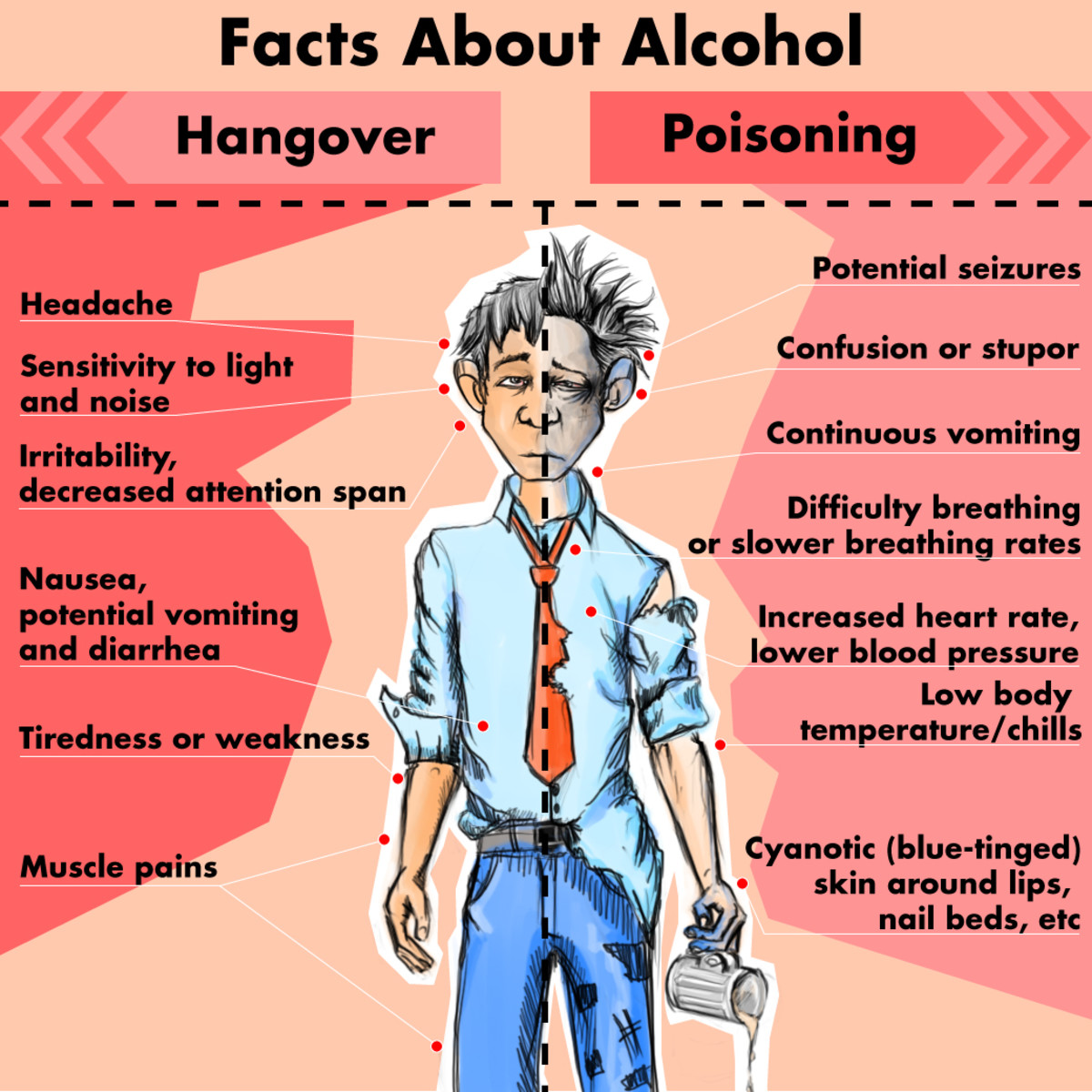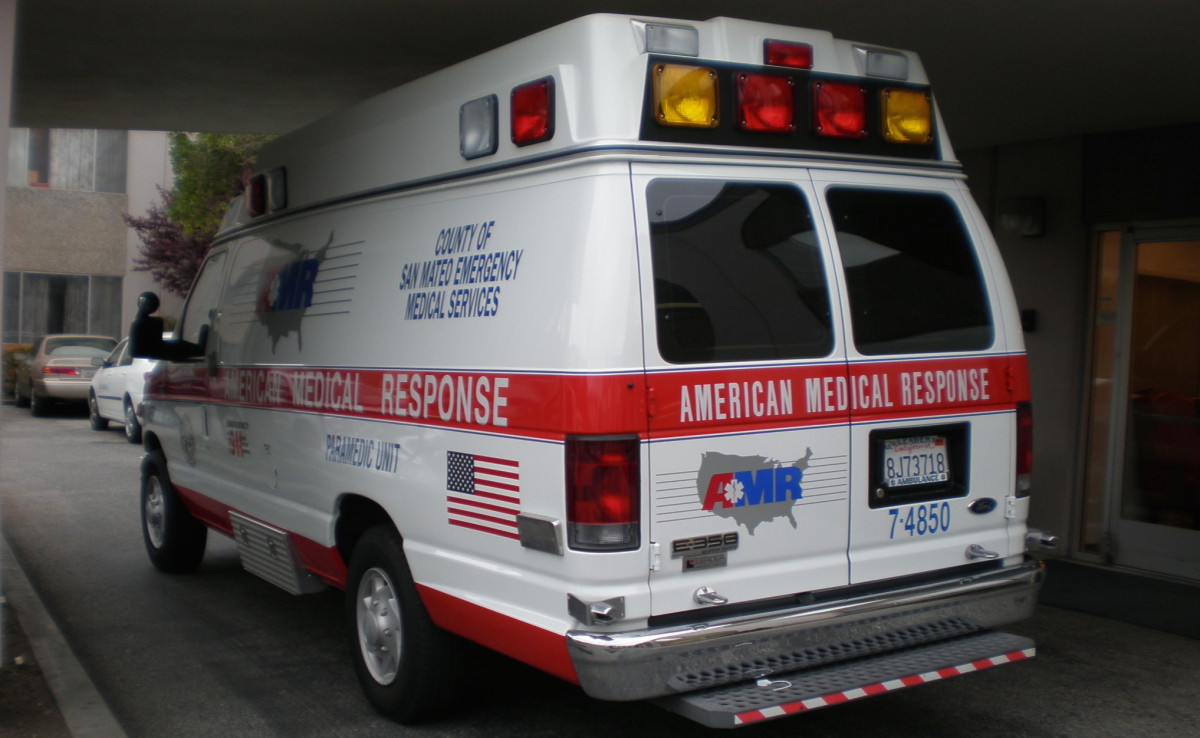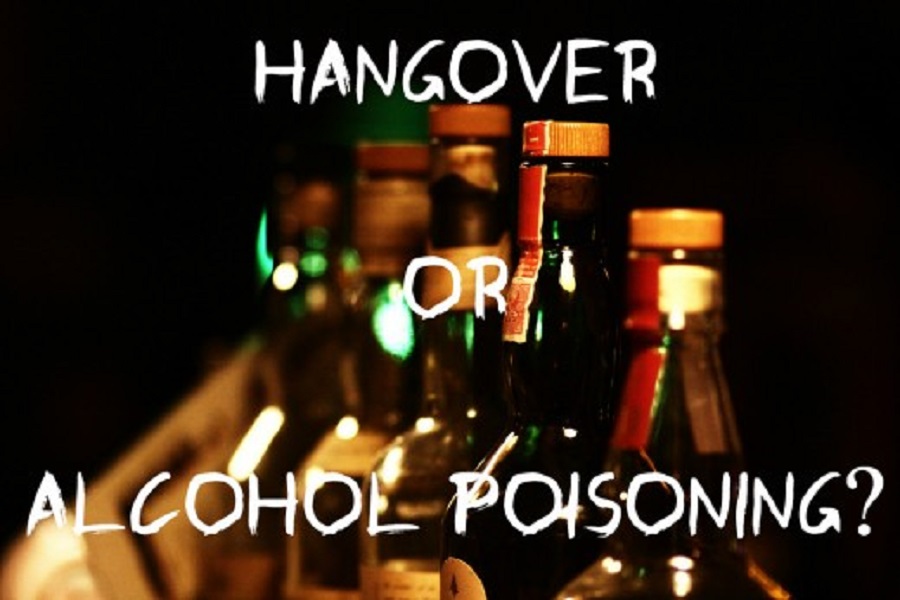We’ve All Been There
We’ve all been there at least once in our lives. Saturday night rolls around, and your buddies beg you to go out with them for a “few beers.” Before you know it, you’re crawling out of the stinky backseat of a taxicab at 4 in the morning, wishing you had never left your couch eight hours before. It takes you ten minutes just to find your keys, and then you step on the innocent cat’s tail on your way in the door. You collapse on the bed and fall asleep, hoping the spinning feeling will end soon.
When morning arrives, you find yourself HATING life. Your head is pounding and the spins are still ever-present. Are you having a normal hangover—or could you be on the brink of alcohol poisoning?

Signs of a Hangover
Maybe you still reek of alcohol; maybe you can still taste the booze on your breath. Did you puke last night? You can’t quite remember, but this headache is killer! How do you know if you just have a regular hangover? How do you know it’s not something more?
Here are the cardinal signs that you are having a typical (but quite unpleasant) hangover:
- headache
- sensitivity to light and noise
- nausea, potential vomiting and diarrhea
- irritability, decreased attention span
- you may feel extremely tired and weak
- muscle pains are possible
- you don’t want to eat much (or you may prefer to eat something filling and greasy)
Hangover symptoms are different for everyone and vary depending on the quantity of alcohol consumed in a night. Obviously the more you drink, the more intense your symptoms will be the next day. But why do we experience these symptoms and how can we avoid them? We’ll find out soon enough, but let’s first see how a hangover is different from alcohol poisoning.

Signs of Alcohol Poisoning
Alcohol poisoning is a step up from a hangover. It is more intense and more dangerous to one’s body, and it can occur faster. A hangover is usually experienced the next day, whereas alcohol poisoning can be experienced around the same time as the alcohol consumption. However, alcohol poisoning can also be experienced the next day. So how can you tell the difference between a hangover and alcohol poisoning?
Here are the cardinal signs of alcohol poisoning:
- low body temperature, chills, you just can’t get warm no matter what you do!
- increased heart rate, lower blood pressure
- continuous vomiting
- difficulty breathing or slower breathing rate
- confusion or stupor
- potential seizures
- cyanotic (blue-tinged) skin around lips, nail beds, etc.
If you are with someone who seems to be experiencing these symptoms, check their body temperature with a thermometer. If the person is unconscious, passed out, or cannot be roused, you need to get help immediately.

What To Do If You Suspect Alcohol Poisoning
Alcohol poisoning is very serious and can be fatal. If you are with someone who is having trouble breathing, is vomiting profusely, or is confused or in a stupor—or if you notice any other signs of alcohol poisoning—call an ambulance or the poison control center immediately. You don’t ever want to leave a person with alcohol poisoning in a tub or sleeping by themselves because they can lose their gag reflex. This means that if they vomit and no one is around, they can easily choke on their own vomit and die.
Cold showers or baths are not a good idea, as the body temperature is already dropping. Wrap them up in a blanket and monitor their breathing until the ambulance arrives. Prop them up with pillows or blankets to prevent potential vomiting and aspiration (choking).
If the person you are worried about is you, hopefully you are alert enough to realize it! You need to get help immediately. Call 911 or a poison control center to get help ASAP. If it’s the next day, you might feel severely dehydrated along with the other alcohol poisoning symptoms. Rehydrate yourself with lots of water (even if you continually vomit it back up), and try to eat something filling. If you have anything beyond mild dehydration and a headache, you need to go to the hospital.

How to Avoid Alcohol Poisoning
To avoid all of this unpleasantness, the easiest thing to do is to control your drinking (if indeed you still plan to drink). Stop yourself after two drinks, as hard as that might be. This will help you avoid a hangover the next morning, and it will definitely prevent alcohol poisoning. You should also be drinking water between drinks and after drinking to prevent the alcohol from dehydrating your body (alcohol is a diuretic, meaning it makes your body flush out fluids). Also, make sure you have a good, heavy meal before drinking.
Never drink and drive. Call a cab, uber, or a friend!

